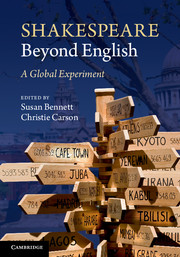Book contents
- Frontmatter
- Contents
- List of Illustrations
- List of colour plates
- Notes on contributors
- Foreword
- Acknowledgements
- Introduction
- The Globe to Globe Festival: An Introduction
- Performance Calendar
- Week One
- Week Two
- Week Three
- Week Four
- Week Five
- Week Six
- Chapter Thirty-Five Habima Merchant of Venice
- Chapter Thirty-Six Patriotism, Presentism and the Spanish Henry VIII
- Chapter Thirty-Seven Touch and Taboo in Roy-e-Sabs’ The Comedy of Errors
- Chapter Thirty-Eight Shakespeare and the Euro-crisis
- Chapter Thirty-Nine Restaging Reception
- Chapter Forty Reviving Hamlet? Nekrošius’ Lithuanian ‘Classic’
- Afterwords
- Index
- Plate section
- References
Chapter Thirty-Eight - Shakespeare and the Euro-crisis
The Bremer Shakespeare Company's Timon aus Athen
Published online by Cambridge University Press: 05 June 2014
- Frontmatter
- Contents
- List of Illustrations
- List of colour plates
- Notes on contributors
- Foreword
- Acknowledgements
- Introduction
- The Globe to Globe Festival: An Introduction
- Performance Calendar
- Week One
- Week Two
- Week Three
- Week Four
- Week Five
- Week Six
- Chapter Thirty-Five Habima Merchant of Venice
- Chapter Thirty-Six Patriotism, Presentism and the Spanish Henry VIII
- Chapter Thirty-Seven Touch and Taboo in Roy-e-Sabs’ The Comedy of Errors
- Chapter Thirty-Eight Shakespeare and the Euro-crisis
- Chapter Thirty-Nine Restaging Reception
- Chapter Forty Reviving Hamlet? Nekrošius’ Lithuanian ‘Classic’
- Afterwords
- Index
- Plate section
- References
Summary
Embracing the full performative potential of Shakespeare's Globe, the Bremer Shakespeare Company's (BSC) production of Timon aus Athen (Timon of Athens) retained an essential spatial fidelity to the Globe, even as their adaptation deviated radically from Shakespeare's text. Although the production remained faithful to the emotions and moral argument of the original, the adaption shook its audience with a litany of contemporary allusions, linking the play directly to the current European financial crisis and German politics: ‘Bankrupt bankers, please increase your bonuses. Politicians, give up your positions early, enjoy your severance package or pension. And if you still want to play a role, switch sides to business.’ Such moments demonstrate what Dennis Kennedy has called the ‘direct access to the power of the plays’ paradigmatic of the experimental mode of ‘foreign Shakespeare’, and also reflect Ton Hoenselaars’ argument that translation can ‘[make] Shakespeare into a contemporary interlocutor capable of addressing the issues that concern us today’. Timon's problems with liquidity directly played on the political frisson generated by the fact that a London audience were watching Germans performing a work about a Greek financial crisis. Yet the direct concerns of that audience were also referenced, when Timon instructed the groundlings to ‘burn down the Globe and replace it with a bank’, since, ‘after all, another bank is exactly what London needs!’ Here was a typically Brechtian call to action which contributed to the sharp political tone of the production. Intriguingly, the BSC's version of Timon was not the only version playing in London as part of the World Shakespeare Festival to make such contemporary political allusions. The National Theatre's production similarly pursued the theme of financial crisis, albeit in the wholly updated setting of contemporary London with allusions to city sponsors, the Occupy Movement and street people.
- Type
- Chapter
- Information
- Shakespeare beyond EnglishA Global Experiment, pp. 287 - 291Publisher: Cambridge University PressPrint publication year: 2013
References
- 2
- Cited by

